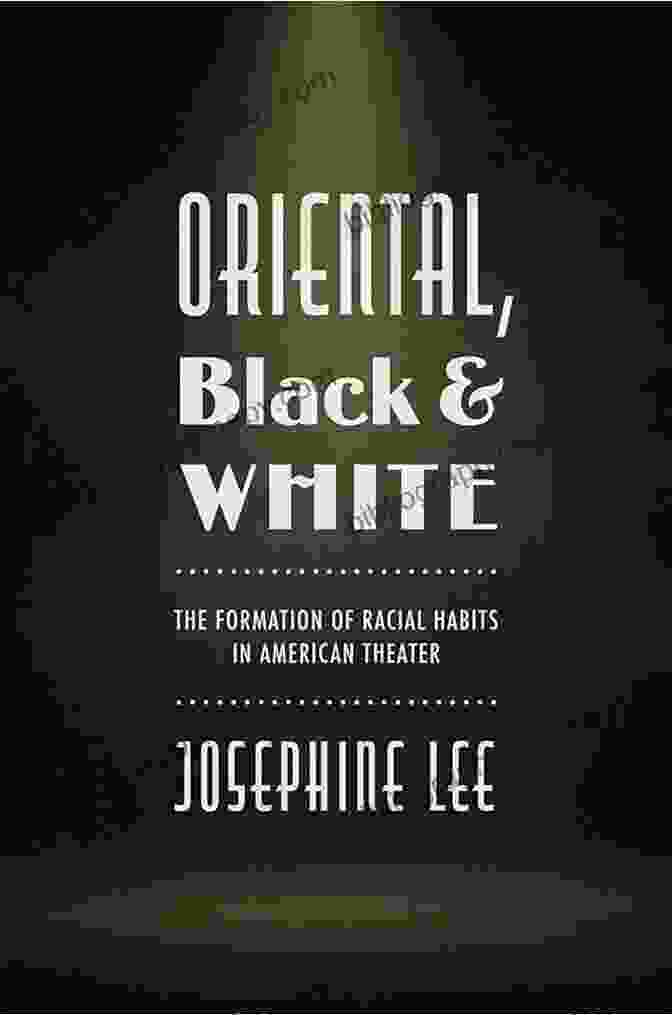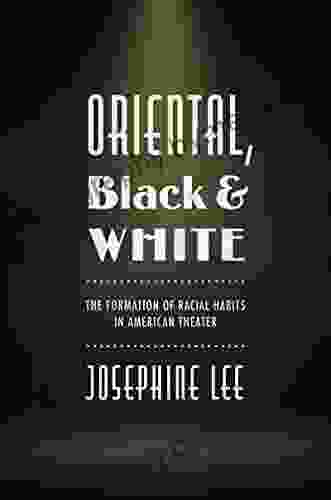Unveiling the Implicit Bias: A Comprehensive Exploration of Racial Habits in American Theater

The American theater, a vibrant and multifaceted tapestry of human expression, has long mirrored the societal norms and beliefs of its time. Unfortunately, these norms have often included deeply ingrained racial stereotypes and prejudices that have shaped the way stories have been told, characters have been portrayed, and audiences have been engaged.
4 out of 5
| Language | : | English |
| File size | : | 1459 KB |
| Text-to-Speech | : | Enabled |
| Print length | : | 192 pages |
In her groundbreaking work, "The Formation of Racial Habits in American Theater," Dr. Alisa Solomon delves into the subconscious biases that have permeated the fabric of American theater for centuries. Drawing on decades of research, she uncovers the ways in which these habits have influenced everything from casting decisions to audience reception, leaving a lasting impact on the representation of race on the stage.
Implicit Bias and the Theater
Implicit bias, also known as unconscious bias, refers to the automatic and unintentional stereotypes and prejudices that we hold about individuals based on their race, gender, ethnicity, or other characteristics. These biases can manifest in various ways, including:
- Stereotypical casting: Actors of color are often typecast into specific roles, such as the subservient servant or the exotic other, reinforcing harmful stereotypes.
- Limited opportunities: Racial minorities are underrepresented in leadership positions, both on and off the stage, creating a lack of diversity in decision-making and artistic direction.
- Audience biases: Audiences may unconsciously prefer shows with predominantly white casts or storylines, perpetuating the notion that whiteness is the norm.
Dr. Solomon's comprehensive analysis exposes the detrimental effects of implicit bias in the theater, demonstrating how it undermines the principles of equity and inclusion that should be paramount in any artistic endeavor.
Historical Roots of Racial Habits
The racial habits prevalent in American theater have their roots in the nation's complex history of slavery, colonialism, and racial segregation. These institutions created a deeply ingrained system of white supremacy that shaped all aspects of American society, including the arts.
Blackface minstrelsy, a demeaning form of entertainment that caricatured African Americans, was hugely popular in the 19th century and early 20th century. It reinforced negative stereotypes that portrayed Black people as lazy, ignorant, and subservient, cementing these stereotypes into the collective American consciousness.
Even after the Civil Rights Movement, racial bias continued to permeate the theater, albeit in more subtle ways. The lack of representation of racial minorities on stage and behind the scenes perpetuated the idea that whiteness was the default and that stories about people of color were not as valuable.
Confronting the Bias
Dr. Solomon's work is not merely an exposé of racial habits in American theater; it is also a clarion call for change. She offers actionable steps that individuals and institutions can take to dismantle these biases and create a more equitable and inclusive theater landscape:
- Educate and raise awareness: It is crucial to educate audiences, artists, and administrators about implicit bias and its impact on representation.
- Increase diversity in casting and leadership: Making a conscious effort to diversify the pool of actors and creatives involved in productions can challenge stereotypes and provide opportunities for underrepresented voices.
- Create inclusive work environments: Theaters should foster environments where all individuals feel welcome, respected, and valued, regardless of their race.
- Challenge stereotypical storytelling: Playwrights, directors, and actors should critically examine the ways in which race is portrayed in their work and strive to create more nuanced and authentic representations.
By confronting the racial habits ingrained in American theater, we can create a more inclusive and vibrant artistic landscape that truly reflects the diversity of our society.
"The Formation of Racial Habits in American Theater" is a meticulously researched and thought-provoking examination of a complex and often uncomfortable topic. Dr. Alisa Solomon's incisive analysis sheds light on the deep-seated racial biases that have shaped American theater for centuries.
This groundbreaking work challenges us to confront our own unconscious biases and work together to create a more equitable and inclusive theater landscape. By embracing diversity, challenging stereotypes, and fostering inclusive practices, we can create a theater that truly represents the vibrant tapestry of the human experience.
Join the movement to transform American theater, one stage at a time. Dive into Dr. Solomon's groundbreaking work today and become part of the change.

4 out of 5
| Language | : | English |
| File size | : | 1459 KB |
| Text-to-Speech | : | Enabled |
| Print length | : | 192 pages |
Do you want to contribute by writing guest posts on this blog?
Please contact us and send us a resume of previous articles that you have written.
 Book
Book Novel
Novel Page
Page Chapter
Chapter Text
Text Story
Story Genre
Genre Reader
Reader Library
Library Paperback
Paperback E-book
E-book Magazine
Magazine Newspaper
Newspaper Paragraph
Paragraph Sentence
Sentence Bookmark
Bookmark Shelf
Shelf Glossary
Glossary Bibliography
Bibliography Foreword
Foreword Preface
Preface Synopsis
Synopsis Annotation
Annotation Footnote
Footnote Manuscript
Manuscript Scroll
Scroll Codex
Codex Tome
Tome Bestseller
Bestseller Classics
Classics Library card
Library card Narrative
Narrative Biography
Biography Autobiography
Autobiography Memoir
Memoir Reference
Reference Encyclopedia
Encyclopedia Iniya Chitravel
Iniya Chitravel Gill Lewis
Gill Lewis Friedrich Glauser
Friedrich Glauser Kasun Indrasiri
Kasun Indrasiri Gary Krist
Gary Krist Olivia Longray
Olivia Longray Gia Scott
Gia Scott George Hehir
George Hehir Brook Wilder
Brook Wilder Juan Montero
Juan Montero Waldtraut Lewin
Waldtraut Lewin Margaret Mcmullan
Margaret Mcmullan Jan Spivey Gilchrist
Jan Spivey Gilchrist Kay Hooper
Kay Hooper Meridee Winters
Meridee Winters John B Taylor
John B Taylor Patricia Harris
Patricia Harris Martin Oliver
Martin Oliver Gerard Taylor
Gerard Taylor Gene Zion
Gene Zion
Light bulbAdvertise smarter! Our strategic ad space ensures maximum exposure. Reserve your spot today!

 Ethan GraySEO Copywriting 101: 20 Tips for Practical SEO Copywriting to Skyrocket Your...
Ethan GraySEO Copywriting 101: 20 Tips for Practical SEO Copywriting to Skyrocket Your... Isaiah PowellFollow ·11.3k
Isaiah PowellFollow ·11.3k Camden MitchellFollow ·12.8k
Camden MitchellFollow ·12.8k Dawson ReedFollow ·15.8k
Dawson ReedFollow ·15.8k Isaac BellFollow ·3.2k
Isaac BellFollow ·3.2k Jarrett BlairFollow ·4.3k
Jarrett BlairFollow ·4.3k Casey BellFollow ·15.5k
Casey BellFollow ·15.5k Joseph ConradFollow ·19.9k
Joseph ConradFollow ·19.9k Edgar CoxFollow ·8.8k
Edgar CoxFollow ·8.8k

 Brian West
Brian WestSmedley Butler: The Marines and the Making and Breaking...
: A Marine's...

 Gabriel Garcia Marquez
Gabriel Garcia MarquezIschia, Capri, Sorrento, Positano, And Amalfi: An...
Explore the...

 Felix Carter
Felix CarterAdorn Your Little Princess with Fleur Ange's Exquisite...
Welcome to the enchanting...

 Kelly Blair
Kelly BlairUnveiling the Secrets of the Historical Way and Fishermen...
Step into the pages...

 Angelo Ward
Angelo WardKnit the Cutest Thumbless Mittens for Your Little One:...
Prepare to be...
4 out of 5
| Language | : | English |
| File size | : | 1459 KB |
| Text-to-Speech | : | Enabled |
| Print length | : | 192 pages |












